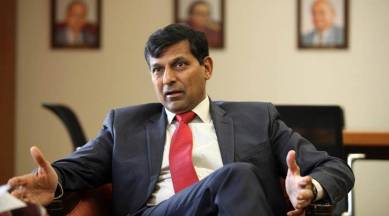RBI keeps repo rate unchanged at 6.7%; CRR at 4%
“The Reserve Bank will adjust the forecast path as and when more clarity emerges on the timing of the implementation,” said the statement.

The Reserve Bank of India left its policy rates unchanged in its final monetary policy review for this financial year. The benchmark repo rate, at which RBI lends to banks, is unchanged at 6.75 per cent after the central bank had frontloaded its cuts – by more than expected 50 bps – in September.
The central bank said that while inflation has evolved closely along its expected trajectory – expecting to hit six per cent for January 2016 – the implementation of the seventh central pay commission awards will push it higher in the coming months.
monthly limit of free stories.
with an Express account.
“The Reserve Bank will adjust the forecast path as and when more clarity emerges on the timing of the implementation,” said the statement. The central bank also noted that the distribution of the monsoon and impact of geo-political events on commodity prices and financial markets add more uncertainty.
That said, RBI maintained that it will continue to be accommodating – i.e. cut rates when it gets the space – even as it leaves rates unchanged in the current review. However, it fired another salvo at the government warning about the need to maintain fiscal rectitude. Governor Raghuram Rajan in recent speeches had questioned the need for a fiscal stimulus amidst increasing calls from some quarters for increased government spending.
“Structural reforms in the forthcoming Union Budget that boost growth while controlling spending will create more space for monetary policy to support growth, while also ensuring that inflation remains on the projected path of 5 per cent by the end of 2016-17,” the statement said.
“The Indian economy is currently being viewed as a beacon of stability because of the steady disinflation, a modest current account deficit and commitment to fiscal rectitude. This needs to be maintained so that the foundations of stable and sustainable growth are strengthened,” the statement added.
That apart, the Reserve Bank also said it will take steps to ease doing business and contribute to an ecosystem that is conducive for growth of start-ups keeping the government’s Start-up India initiative in mind.
“These measures will create an enabling framework for receiving foreign venture capital, differing contractual structures embedded in investment instruments, deferring receipt of considerations for transfer of ownership, facilities for escrow arrangements and simplification of documentation and reporting procedures,” the statement said.